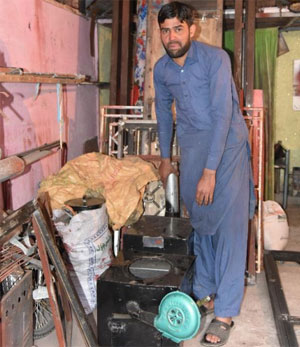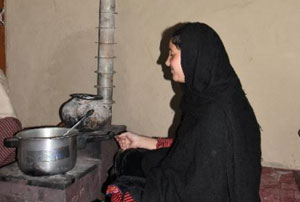Pallandri, a small town in Suadhoti district of Azad Jammu and Kashmir (AJK) has an abundance of forest cover. Local residents chop wood and use it as the primary fuel for cooking purposes and heating their homes during winters. Regular cutting of trees does not bode well for the region. Resultantly, the price of firewood has seen a significant hike due to depletion of forests.
Nadeem Anjum, 26 years of age, owns a welding shop in Pallandri. Until October 2019, he was only making steel products including steel railings, gates, doors, and their frames that every other welder also offered. In late September, he learned of an upcoming community meeting to promote energy-efficient stoves. This community meeting was held as a part of the USAID Ambassador’s Fund Grant Program (AFGP) that was “encouraging social entrepreneurship through demonstration and dissemination of energy-efficient stove technology in the rural communities of AJK” project, which was being implemented by Sukhi Development Foundation (SDF).

Realizing the importance and benefits of fuel-efficient stove technology, Anjum immediately got himself enlisted for the training program to learn manufacturing techniques of these stoves, through a local social activist who was handling registrations on behalf of SDF. Registered welders were to participate in a six-day technical and vocational training at Mirpur University of Science and Technology (MUST). The primary aim of this unique intervention was to equip locals with the skills for assembling fuel-efficient stoves and using them for cooking and heating. SDF implemented the project in three districts – Bagh, Rawalakot, and Sandhoti – for curtailing deforestation and promoting social entrepreneurship by training the locals to make and use fuel-efficient stoves.
SDF collaborated with the Faculty of Engineering at Mirpur University of Science and Technology (MUST), which assisted in significantly improving the design of stoves. These new stoves required 40 percent less wood than the conventional ones for cooking and heating purposes. Moreover, the refurbished design allowed heating of multiple utensils at the same time. It can also heat a water tank through copper pipes along with having adequate space for baking. A chimney attached to it, filters the smoke out, while its fins help keep the surroundings warm. More importantly, a fan helps ignite the fire instead of the traditional method of blowing air through a small metallic pipe, which caused breathing problems among women.
Anjum along with 19 other welders learned about this innovative stove and its manufacturing techniques. After completing the training, he participated in an exhibition to promote the new stove in Pallandri. This has also helped him expand his business significantly. Having already received orders to manufacture six stoves, he is hopeful about getting more orders soon.

“These stoves will help reduce deforestation because they only consume one-third the amount consumed by conventional stoves. Lung-related diseases will also be reduced because of the addition of the fan,” says Anjum.
Lastly, Nazmeen Akhtar, who lives in the Mujahidabad area of district Rawalakot, has been using the new stove for two months now. “We are burning only one log; earlier, we used to burn three. Our kitchen has become warm and cozy, and children now sleep here at night. Most importantly, our economic condition has also improved due to decreased purchase of firewood. This stove has made our life easier.”




















